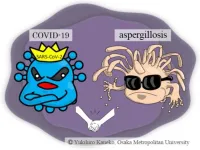(Press-News.org) A new type of blood test using lipids could make it easier to identify children at risk of complications around obesity including type two diabetes, liver and heart disease, say scientists.
A new study from King’s College London published in Nature Medicine reveals a new relationship between lipids and diseases impacting metabolism in children, which could serve as an early warning system for conditions like liver disease.
Using machines that test blood plasma in babies that already exist in hospitals, the researchers suggest this could help doctors spot early signs of disease in children quicker and help them access the right treatment.
The findings also contest the common idea that cholesterol is a leading cause of complications around obesity in children, identifying new lipid molecules which contribute to health risks like blood pressure but are not only correlated with a child’s weight.
Lipids have traditionally been thought to be fatty acids in the body, either good or bad types of cholesterol or triglycerides, fats found in the bloodstream that is the most common in the human body. Recent studies from the same group of scientists have suggested that the picture is more complex.
Using a technique associated with chemistry called mass spectrometry, current evidence puts the types of different lipid present in the body in the thousands, each with separate functions.
Taking a control sample of 1,300 children with obesity, the team assessed their lipids in blood. Afterwards 200 of them were put on the HOLBAEK-model for a year, a lifestyle intervention for people with obesity popular in Denmark.
Subsequent readings showed that amongst the intervention group, counts of lipids tied to diabetes risk, insulin resistance and blood pressure decreased, despite limited improvements in some children’s BMI.
Dr Cristina Legido-Quigley, a group leader in Systems Medicine at King’s College London, Head of Systems Medicine at the Steno Diabetes Centre Copenhagen (SDCC) and principal author, said: “For decades, scientists have relied on a classification system for lipids that have split them into good and bad cholesterol, but now with a simple blood test we can assess a much broader range of lipid molecules that could serve as vital early warning signs for illness. In the future, this has the potential to be an entirely new way to evaluate someone’s personal risk of disease and by studying how to change lipid molecules in the body, we could even prevent metabolic diseases like diabetes altogether.”
Obesity continues to be a risk factor for conditions like fatty liver disease, but the team hope that doctors can use these measurements to treat children when they are at risk and not just a little larger than their peers.
Dr Karolina Sulek, who was part of the study and performed analysis at the SDCC, said: “Early recognition of children at risk for these life-threatening diseases is crucial. The study provides strong evidence of the great need for obesity management and gives parents confidence to intervene in their children’s life more compassionately, helping them to lose weight."
The next step for the researchers is to help understand how genetics affects lipids and what this means for metabolic diseases, as well as how these lipids can be changed to improve health.
ENDS
END
New blood test could be an early warning for child diabetes
2024-09-20
ELSE PRESS RELEASES FROM THIS DATE:
Oceanic life found to be thriving thanks to Saharan dust blown from thousands of kilometers away
2024-09-20
Iron is a micronutrient indispensable for life, enabling processes such as respiration, photosynthesis, and DNA synthesis. Iron availability is often a limiting resource in today’s oceans, which means that increasing the flow of iron into them can increase the amount of carbon fixed by phytoplankton, with consequences for the global climate.
Iron ends up in oceans and terrestrial ecosystems through rivers, melting glaciers, hydrothermal activity, and especially wind. But not all its chemical forms are ‘bioreactive’, that is, available for organisms ...
Analysis sheds light on COVID-19-associated disease in Japan
2024-09-20
As society learns to live with COVID-19, research on the disease and its complications remains important. Thus, an Osaka Metropolitan University team has pored through data to understand the incidence in Japan of COVID-19-associated pulmonary aspergillosis (CAPA), a severe invasive fungal infection of the lungs.
Few studies have been conducted on CAPA in Japan, but reports from overseas put the incidence between 3.8% and 35%.
Using Japanese administrative claims data, Graduate School of Medicine Lecturer Waki Imoto, graduate student Mr. Yasutaka Ihara, Professor Ayumi Shintani, ...
Cooler heads prevail: New research reveals best way to prevent dogs from overheating
2024-09-20
FOR MORE INFORMATION
Michael San Filippo
Senior Media Relations Manager
American Veterinary Medical Association
Cell/Text: 847-732-6194
msanfilippo@avma.org
Cooler heads prevail: New research reveals best way to prevent dogs from overheating
(SCHAUMBURG, Illinois) September 19, 2024— As temperatures continue to soar across the country, a simple yet innovative technique could be the key to keeping dogs safe from heat-related illnesses.
New research published in the Journal of the American Veterinary Medical Association (JAVMA) reveals that teaching dogs ...
UC Riverside medical school develops new curriculum to address substance use crisis
2024-09-20
RIVERSIDE, Calif. -- Nearly 6,000 opioid-related overdose deaths occurred in California in 2021, many due to fentanyl, a synthetic opioid. To address the crisis, a team of researchers in the School of Medicine, or SOM, at the University of California, Riverside, plans to develop and implement a curriculum that offers education on substance use disorders to medical students early and throughout their education.
To facilitate the development of the curriculum, the team has been awarded a grant of $900,000 from the Substance Abuse ...
Food fussiness a largely genetic trait from toddlerhood to adolescence
2024-09-19
Fussy eating is mainly influenced by genes and is a stable trait lasting from toddlerhood to early adolescence, finds a new study led by researchers from UCL (University College London), King’s College London and the University of Leeds.
The study, published in the Journal of Child Psychology & Psychiatry and funded by the UK mental health charity MQ Mental Health Research, compared survey results of parents with identical or non-identical twins in England and Wales from the ages of 16 months to 13 years.
The ...
Celebrating a century of scholarship: Isis examines the HSS at 100
2024-09-19
Isis: A Journal of the History of Science Society is widely recognized as a leading voice in the history of science. George Sarton founded the journal in 1912, and two years later the History of Science Society (HSS) was formed to advance the journal’s mission and centralize the nascent discipline. The September 2024 issue of Isis pays tribute to the centennial anniversary of the HSS with a collection of articles that delve into the rich history of the society and its publications.
In their introduction to the issue, editors Alexandra Hui and Matthew Lavine write that the issue can be seen as “a love letter of sorts: to the Isis readership, ...
Key biomarkers identified for predicting disability progression in multiple sclerosis
2024-09-19
A pioneering study presented today at ECTRIMS 2024 has identified critical biomarkers that can predict disability worsening in multiple sclerosis (MS). The breakthrough research has the potential to transform treatment strategies for millions of MS patients worldwide, paving the way for more personalised and effective treatment plans.1
In this multicentre observational study, conducted across 13 hospitals in Spain and Italy, Dr. Enric Monreal and his team found that elevated serum neurofilament light chain (sNfL) levels—a protein indicating nerve cell damage—at the onset of MS can predict both relapse-associated worsening (RAW) and progression independent ...
Study: AI could lead to inconsistent outcomes in home surveillance
2024-09-19
CAMBRIDGE, MA — A new study from researchers at MIT and Penn State University reveals that if large language models were to be used in home surveillance, they could recommend calling the police even when surveillance videos show no criminal activity.
In addition, the models the researchers studied were inconsistent in which videos they flagged for police intervention. For instance, a model might flag one video that shows a vehicle break-in but not flag another video that shows a similar activity. Models often disagreed with one another over whether to call the police ...
Study: Networks of Beliefs theory integrates internal & external dynamics
2024-09-19
The beliefs we hold develop from a complex dance between our internal and external lives. Our personal-level cognition and our relationships with others work in concert to shape our views of the world and influence how likely we are to update those views when we encounter new information. In the past, these two levels of belief have been studied largely in isolation: psychologists have modeled the individual-level cognitive processes while researchers in fields from computational social science to statistical physics have offered insights ...
Vegans’ intake of protein and essential amino acids is adequate but ultra-processed products are also needed
2024-09-19
In an article published in JAMA Network Open, researchers at the University of São Paulo’s Medical School (FM-USP) report on a study involving 774 men and women who followed a vegan diet in Brazil.
Their findings show that on average the participants consumed the recommended amount of proteins and essential amino acids, and that their diet consisted largely of unprocessed and minimally processed foods. However, participants who consumed proportionally lower levels of industrialized products such as protein supplements and textured soy protein were more likely to exhibit inadequate ...



